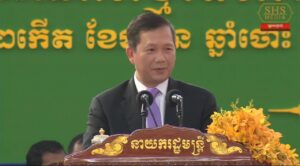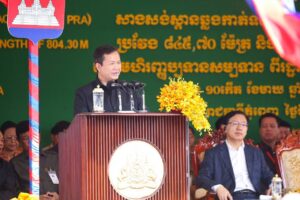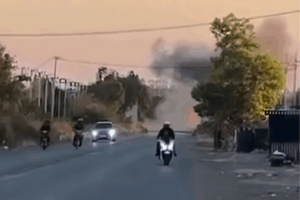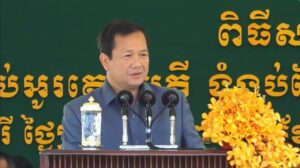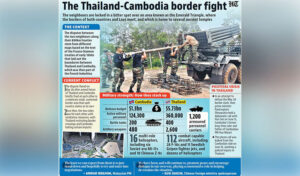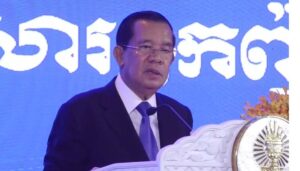Selected Comments of Samdech Thipadei Hun Manet, at the ninth meeting with some 1,000 wiseman-woman across the country [Unofficial translations]
[1]
(1) Wiseman-woman play important roles in maintaining the practice and the preservation of the Khmer traditions
Cambodia has gotten a clear cultural tradition and civilization for thousands of years […] although the country has moved into the stage of advancement and wide-ranging education, where, in the modern age, people have access to smart phones, create computer programs, still, in real life people continue to maintain national identity […] tradition and culture are always evolving […] the practice of the wiseman-woman must follow the same unified ethical rule so that two wiseman-woman working together without problem […] thus, we should organize not only the training courses but also the code of conducts and rules of practice. Should someone want to change or develop something, there should be a committee to look into the request, (and once approved) share it (to everyone) […] there has to be a unified principle. We are doing this to prevent deviation of tradition and customs. Even if they are to deviate, there must be a unity and national identity […] wiseman-woman are the ones who practice these rules. The training is just an orientation. The wiseman-woman play important roles in maintaining the practice and the preservation of the Khmer traditions […]
(2) There need to be a unified rule to represent a national identity for wiseman-woman
Those wiseman-woman with many years of experience should act as personal trainers for the next generation of wiseman-woman […] there should be a commonly unified rule to represent a national identity […] which will help wiseman-woman to organize ceremony locally or abroad with one standard rule […] to preserve national identity, there needs to have a clear foundation, for which researching and documentation is important. Not only in religious ceremonies, even in history or in art, where some forms are at risk of being lost if not documented […] there are three parts to cultural development – research, compilation, and maintenance […] therefore, it is necessary to have a committee working as a mechanism responsible for researching and approving the methods of implementation […] I call on further encouragement in preserving the culture, and keeping it from deviation. The orientation and efforts of the Ministry of Cults and Religions in this arrangement are important […]
[2]
(3) Wiseman-woman takes part in training about virtues and morals, and maintaining peace and stability
Regarding social morality, we cannot use only legal measures. The measure of morality and virtue is important. The use of soft power to educate the human value in everyone without the need for the police to arrest (is what we are aiming for). If people have such value in themselves, they know that motorcycle wheelies is dangerous and it is not in conformity with the value of our national identity and culture […] the Cambodian society observes hierarchy, whereby in religion, monks and abbots have respect from the people […] therefore, the role of wiseman-woman does not only to uphold unity in each ceremonial protocol, but to take part in training about virtues and morals and to maintain peace and stability, because that will make people have peace of mind, non-violence, and cause no harm to social order […] physical education, morality, virtue is a direct social education. When young people, citizens, live ethically, and understand the values of society and culture, they can participate as important individuals, not only with knowledge, ability, but also understanding of virtues, morals and social behavior values […] whereas, psychological education and personal value is in fact the participation in the policy of safe villages, communes/sangkats […]
(4) Compiling, disseminating and practicing are the three components to care for culture/religion
These days, social media access allows easier communication and access to foreign civilizations and cultures. It is not that we forbid people from making copy or from watching (other cultures), or to learn from them, but we have to (have the ability to basically determine) what is good and what is not good. We encourage learning, creativity, knowledge, culture and so on, but please be careful not to overdo it to lose our national identity […] even if we shall be experiencing modernity for another 1,000 years, as a country, our people must not lose their national identity. We do not forbid evolution but it has to happen the Cambodian way, with the right national rules […] to care for cultural and/or religion, there must be three steps of work to be carried out – firstly, compile the rules and publish them. Secondly, disseminate findings through training and/or workshops, and, thirdly, the practice part, which is important […] I encourage attention on the three elements, especially the third one […]
(5) The main reason for loss of territory and sovereignty is the infightings
We see that the civilization and the culture of a nation fluctuates depending on the strength of the nation. Culture and civilization in the glorious era allowed us to spread them to neighboring countries. When the country broke up, we fell back. It had been that not only that the people killed each other in the war, suffered the loss of land, resorted to depending on countries in the west, the east, the north, the south, and moved the city from one place to another, but our religion and culture were also differentiated […] if we do not have mutual understanding and unity, this condition will lead to conflict, falling in the trace of history. Some people are worried that the history of lost territory and sovereignty will repeats itself. However, the main reason for the loss of territory, the loss of sovereignty, is the fact that we always have the infightings. If we are together, we are united, and we are able to talk our differences out, there would be no violence and confrontation […]
(6) Though filled with only Cambodians, if controlled by different factions and armed groups, Cambodia would be in division
Whether agree or disagree (regarding the CLV-Development Triangle Area), we are all the Cambodians. We all are, me include, concerned about the loss of territory and sovereignty. Whether those of us sitting on this forum, whether those of you sitting in front, whether those of you are a civil servant, in any field, and the wiseman-woman, we all have concern about it. The nation consists of its people, its territory, its culture, its civilization, and everyone of us taking direct participation […] if we were to have infightings and fled to take shelters at the border or in this or that area, there comes the national division. Even though the land is filled with only the Cambodians, but if it is controlled by the Cambodians of different factions and armed groups, the country will also in division […]
I am sure that that wiseman-woman are here to take up study is to help preserve our cultural values as the Cambodians. If we do not think about the Cambodian/Khmer values, there would not need to learn all these. (That you all have come to take the course) is because you want to maintain a true value of the identity of the Khmer/Cambodians […] therefore, for such concern not to become a reality, we must work together to maintain and develop territorial sovereignty and make progress for people everywhere, especially in the northeastern provinces, so that the worries we had would not become a reality, but instead, the Cambodians there are strong and maintaining national unity […]
(7) The government is not perfect but we strive to ameliorate shortcomings
I have been listening to the people […] and despites strings of explanations (by concerned authorities), there as a request for the government to withdraw (Cambodia) from the CLV-DTA cooperation […] I would reiterate that the Royal Government, in the last 40 years, has done everything in response to the needs of all citizens. In this seventh legislative term, since its first year, the government has set out five prioritized measures and six prioritized policies to meet the (aspirations) of the people. What do people want? (Firstly,) they want a good health system that they can depend on when they are sick […]; secondly, they want the opportunity to study; (thirdly), they want to have a job opportunity; and (fourthly), they want to live in a safe commune village, where there are no drugs and gangsters […] I have announced already that after setting out the policy framework, I conduct local target visit […] the government is not perfect, I am not perfect, but what is more important is we set the goal to be perfect and to strive to make adjustments to ameliorate the shortcomings […]
(8) The third group with four wishes is the overwhelming majority
Back to the issue of CLV-DTA. There have been some who say the Royal Government does not listen (to the people). I say the Royal Government listens to the common concerns of both supporters and non-supporters (of the CLV-DTA cooperation issue), but of which group of citizens? We have three groups of people. The first group of people are concerned and asking for Cambodia to be removed (from the CLV-DTA). The second group understands the values (of such cooperation) and are supporting the development […] and the third group is what I called the silent majority […]
They want a guarantee that, firstly, the four provinces do not lose territory; secondly, there is no loss of sovereignty; thirdly, the development of these four provinces is ensured; and fourthly, the Cambodians are not divided, and causing social chaos. If we are taking the survey, the third group is surely the majority. Whether to move out or to stay in (the CLV-DTA) or what will or will not happen in another 25 years, have not been the concerns. (They are of the opinion that) even (Cambodia is) moving out of (CLV-DTA), should there be an intention to lose, it would lose, it is not because of the (CLV-DTA) cooperation […] I think the third group of people is the overwhelming majority in the Cambodian nation currently […]
(9) People can vote down the government every five years and there is international law to abide by on sovereignty
Now, that we do not have to worry is because (firstly) people have power (to remove the government) every 5 years […] why? people will give judgment every five years. They (can remove the government by) vote. If the four provinces really disappear, people can just vote down the government. There is no need to fight each other. The government is aware also that should it want the people’s support for another 50 years, there would need to be this fact that the people voted 10 times (for the party) […] on this note, the government is fully aware that this territory is a big topic, not only unconstitutional, […] and (secondly,) in this era, (there is) international law, and no one could just cut land and give it to anyone. On the international stage, Cambodia opposes secession. We do not support separation of sovereign states. If we do not support the separation of states in other countries, how could we work to separate the provinces in our country? We will not do that kind of thing […] I am calling on all of you, those who agree, those who disagree, and the third party, to adhere to the approach of dialogue, express opinions, but do not take actions that harm Cambodian national security, and/or divide national unity […]
(10) Should the Cambodians become a minority in their own land, remove the government through ballots
To end every doubt, I am calling on our people to exercise patience. We cannot fight each other today on what (we think will) happen in 50 years from now. Let us wait and develop together so that in another 25 or 50 years, the Cambodians in those places are stronger, and there will be more people. That will solve all worries and doubts […] should there be a concern that the Royal Government is lying […] when the elections approach, people should go visit places where they have concerns about. Should they see that the Cambodians there will have become the minority (in their own land,) they could just remove (the government through) the ballots.
If by the year 2027-2028, (such concerns have not yet proved to be real), in fear (that the time has not yet come,) and lest they would have come by 2032-2033, then, when the (election) is approaching, you can go see again […] if the Cambodian People’s Party has in its leadership caused the loss of land and sovereignty, the loss of the four provinces, you can just vote to remove it. Then, the suspicion disappears. Let us not stab each other now. Nothing is happening (like the worries that some have). Let us not fight each other internally […]
(11) Together ensure sovereignty and territory not only of the four provinces, but the whole Cambodia for future generations
We must work together to develop these four provinces to ensure the sovereignty and territory, not only the four provinces, but throughout the country, for future generations. We cannot do that, however, if we are divided. A small ember can cause big fire. Starting with just one small thing, what happened in England and in Bangladesh have not been over yet, and the phase of mistrust is growing […] I have seen (words) in a (social media) group that some, living in foreign countries, are mobilizing people – not to protest and/or express their intentions on withdrawing (Cambodia) from CLV-DTA, but to organize (movement) to overthrow the (legitimate) government […] there have been one or two persons in Japan lead and inspire shouting for the Cambodians in the country to take action […]
(12) Does grenades, Molotov cocktails, sticks and catapults a preparation for non-violent demonstrations?
In the morning, I saw there were organizers who collected money, and prepared weapons, which, initially were only catapults, flagpoles, concrete-filled steel tubes, gasoline bottles (Molotov cocktail) […] but by the evening, I saw they have organized a drone team, claiming they have some 300 grenades and ordering a drone strike command on the competent authority like what happened in Ukraine […] some took appearances on Facebook to say that 70% of the authorities were Vietnamese, therefore throwing things at them is not wrong. Such acts clearly reveal violence […]
Does bombs, Molotov cocktails, sticks and catapults a preparation for non-violent demonstrations? On second note, they have cooked up a plan clearly to overthrow the government, not just to remove (Cambodia) from the CLV-DTA. You may ask if they are afraid of losing the country in another 25 or 50 years, why is it necessary to move to the point of territorial division and instability today? […] on this note, I have to listen to the silent majority who does not want to lose sovereignty, lose territory, lose the development of the country, but want to ensure stability, to make their life peaceful […]
(13) RGC is ready to enforce the law on those who set fire to the country and/or inspire actions against the law
For both those who support and those who do not support (the CLV-DTA) cooperation, should they reach this phase of violence, they will have a rift and will not trust each other […] the Royal Government has no other option but take up the duty to enforce the law to protect the rights and freedoms of the 17 million people as a whole, and the two million people dwelling in Phnom Penh for them to live within the framework of law, stability, peace, and to work without fear […] every country has had its problems. There will always be a new issue to face with. We work hard to fulfil our duty. Please give stability a chance. We work together to solve problems, starting from maintaining a common vision to act in no way that leads to violence or revenge. If you want to take care of the territory, you have to join us and not divide […] please express your opinion ethically, and make no appointment to fight and stab each other […] the Royal Government will be ready to apply the law on those who set fire to the country and/or those who inspire actions against the law […]
(14) Would Japan support someone using its territory to incite the overthrow of (the legitimate) governments in other countries?
May all of you, both wiseman and woman, take up the role of preserving the dignity and non-violence of our nation, together resolving concerns and building up the country together. I urge that those wiseman-woman from Stung Treng, Mondulkiri, Ratanakiri, Kratie, upon their returns, help strengthen the culture of the Khmer nation in those four provinces […] I would assure the majority of the people that the Royal Government will guarantee the four points (deemed important by the silent majority). You want sovereignty, territorial defense, development in the Northeast and throughout the country, plus maintaining stability and peace, boosting our economy […]
I suggest that the Ministry of Foreign Affairs (and International Cooperation) ask the Japanese government. Now that there is evidence there. Would Japan support someone using Japanese territory to incite the overthrow of (the legitimate) governments in other countries? […] I did not say that Japan had to expel that person, but we should ask whether Japan supports the use of Japanese territory as a basis for leading demonstrations to overthrow (the legitimate government) as they have said in their messages – “we must overthrow the government” […]
(15) The Cambodians should be warriors fighting for nation, not among themselves
All this is what I said the Royal Government has listened to the people. We must listen to the common opinion to find a solution, but the people must work together to protect the national interest, not to be divided through actions to lose stability and peace and national unity, causing disharmony and conflicts […] when I am saying all this, some mocked me to be afraid. It is true that I am afraid. I am afraid of losing national solidarity. I am afraid that the Cambodians will be amputated again. I am the one who distributed houses to thousands of disabled veterans and orphans due to the war. It is indeed true that I am afraid. I am very scared when Cambodians cannot talk to each other, and fight each other. Some say the Cambodians bear the race of warriors but I would argue they should only fight for the nation, and not among themselves. Please do not go into acts of harming the common interests. They may say whatever they wish, curse or insult me, […] but they must not go as far as to destroy the (country’s) common happiness […]./.

